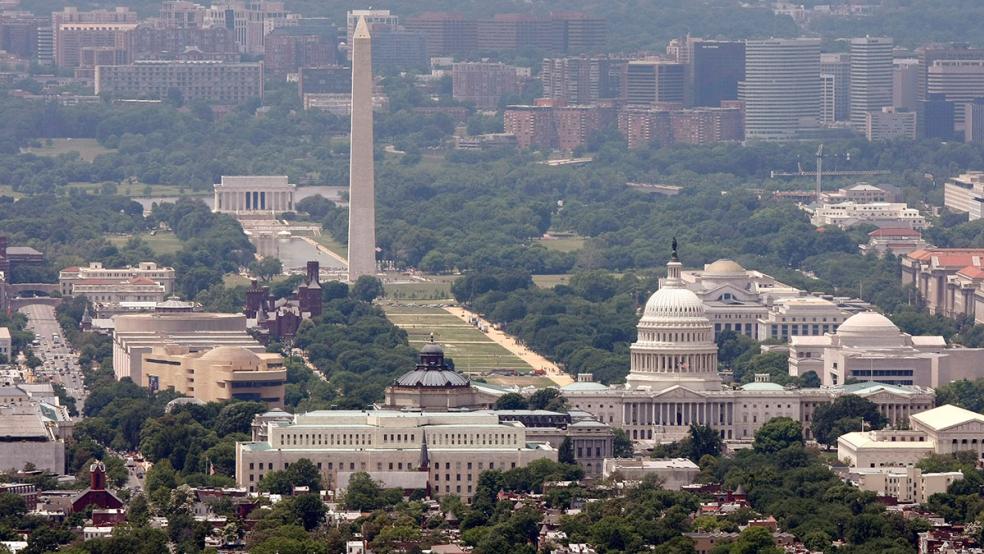Nearly two in three Americans believe that the 2016 presidential campaign between Republican Donald Trump and Democrat Hillary Clinton may be the most consequential election in their life time, according to a new study.
When pressed to identify the most serious problem confronting the country, most cited Washington’s “broken political system,” a problem they say is even more pressing than the mounting threat of terrorism or ongoing concerns about the economy.
Related: ‘So Much for Party Unity’ … GOP Convention Exposes a Deep Fissure
It’s no surprise that the vast majority of Americans revile partisan gridlock in Washington and are looking to political outsiders like the billionaire Trump for fresh and bold approaches to long-festering domestic and foreign policy conundrums. Just 16 percent of Americans approve of Congress’s performance in the latest Gallup survey, a slight improvement over previous assessments.
Yet paradoxically, a new Allstate/Atlantic Media Heartland Monitor poll found that more Americans are convinced that Congress, the White House and the rest of the federal government is far more likely “to provide solutions” than state or local government, big business or non-profit groups.
Washington’s inability to get beyond partisan gridlock is one of the few things that Republicans and Democrats can agree on. According to the national survey of 1,000 adults conducted June 19 through 24, 96 percent of Trump supporters agreed that “the political system in Washington is not working well enough to produce solutions to the nation’s problems,” while 88 percent of Clinton voters had the same view.
There is a “pox on both houses” public attitude towards Republicans and Democrats in Washington as Trump prepares to claim the Republican presidential nomination in Cleveland on Thursday and Clinton readies for the Democratic National Convention in Philadelphia next week.
Related: In Cleveland, Two Immigrants Brace for Trump in Very Different Ways
Yet voters stubbornly cling to the notion that the federal government remains the chief vessel of change. Some 40 percent of Trump supporters and 43 percent of Clinton voters told the pollsters that the federal government was most likely to bring about the needed change.
“Americans’ overwhelming sense of exasperation toward Washington has seeped into numerous facets of their lives,” Claire Foran of The Atlantic wrote in summing up the survey’s findings. “It is a warning sign to both parties over the next few months – get something done or lose the election.”
In many ways, an electorate transfixed on the need to reform and shake up the status quo in Washington plays heavily into Trump’s hand. In vowing to break sharply with political tradition and rewrite the rule book for governing and defending the country, Trump is offering himself up as the ultimate change agent to “Make America Great Again.”
By contrast, Clinton, the former secretary of state and senator from New York, is running on a platform of continuity and competence. She is vowing to protect the legacy of President Obama – especially on health care and foreign policy -- even as she attempts to reach out to more liberal Democrats and independents highly dubious of her policies and turned off by her ties to Wall Street and her email controversy.
Related: Clinton Opens the Door to a Trump Surge in Key Swing States
For all his rough edges, government inexperience and outrageous policies, Trump’s call for shaking up the Washington establishment has resonated within the GOP conservative base.
He has vowed, among other things, to escalate the war on terror to unprecedented levels, renegotiate most major trade agreements, and slap China and other trading partners with steep tariffs. His tax plan could drive up the national debt by cutting trillions of dollars in taxes while opposing reforms of Social Security and other entitlements.
Many of his stands are the antithesis of traditional GOP economic and international trade doctrine. And he has blithely parted company with many GOP governors, lawmakers, intellectuals and rank and file Republicans on key domestic and foreign policy issues. Even some like House Speaker Paul Ryan R-WI) and Senate Majority Leader Mitch McConnell (R-KY) who have reluctantly climbed aboard the Trump band wagon, have openly bridled at Trump’s policies and pronouncements.
“He’s not my kind of conservative, but I come from a different wing of the party,” Ryan told reporters this week ahead of his scheduled prime time address to the convention Tuesday evening. “There will be times in a big-tent party like ours when we will disagree on certain policy issues, but on core principles, we are on the same page.”
Related: 56% of Voters Think Clinton Should Have Been Indicted
Trump’s challenge now is to demonstrate to voters that he not only has catchy campaign slogans and promises to rev up his base but that he and his advisers have substantial ideas and plans to back them up –and that he has the management skills and political acumen to put them in place.
Trump arrived in Cleveland hoping to use the convention not only as a vehicle for sharply attacking Clinton’s record but as a showcase for his own unconventional ideas and leadership skills for changing the way Washington does business.
He still has plenty of time to make that case to the GOP delegates and the millions of Americans watching the convention every night, especially when he delivers his acceptance speech Thursday night.
But it won’t be easy. And after an extraordinarily rocky first day in Cleveland on Monday – including a high-profile floor fight between Trump’s organization and dissident GOP delegates and then a prime time speech by his wife, Melania, that heavily cribbed from a previous Michelle Obama speech – Trump’s talents as a political change agent and leader remain very much in question.





